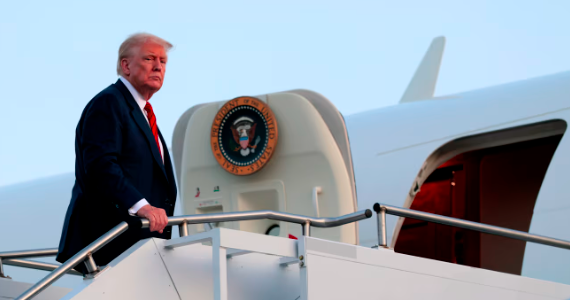




A federal appeals court late Friday invalidated the Trump administration’s key tariffs, determining that the president had exceeded his emergency powers in altering U.S. trade policy.
The 7-4 decision from the U.S. Court of Appeals for the Federal Circuit supported a lower-court ruling that undermines a fundamental aspect of President Trump’s economic strategy. The majority concluded that the president overreached his authority under a 1977 statute known as the International Emergency Economic Powers Act, or Ieepa.
This ruling represents a major setback for one of the hallmark policies of Trump’s second term and paves the way for the case to be taken up by the Supreme Court. The appeals court has permitted the tariffs to stay in effect until mid-October, giving the involved parties time to petition the high court for a review of the case.
Trump expressed his discontent with the ruling in a post on Truth Social. “ALL TARIFFS ARE STILL IN EFFECT! Today a Highly Partisan Appeals Court incorrectly said that our Tariffs should be removed, but they know the United States of America will win in the end,” he stated.
In April, Trump enacted the so-called reciprocal tariffs on nearly all U.S. trading partners during an event he termed “Liberation Day,” which triggered several days of market turmoil and backlash from foreign governments. This led Trump to suspend many of the tariffs to facilitate negotiations with numerous foreign nations. Adjusted tariff rates were implemented in early August, although discussions with many countries are still ongoing.
According to estimates from the Tax Foundation, the reciprocal tariffs are expected to generate about 70% of the projected tariff revenue in 2026, while the administration is also looking to increase tariffs under other legal frameworks that remain unaffected by Friday’s ruling.
The decision has nullified levies that include a baseline tariff of 10% applicable to nearly all countries, along with higher tariffs on nations that the administration deems to be poor trade actors—and an extra set of tariffs specifically targeting Canada, China, and Mexico.
Even if the Supreme Court upholds this decision, it will not eliminate all of Trump’s tariffs from his second term. In addition to the so-called reciprocal tariffs, Trump has also levied various tariffs on sectors such as automobiles, steel, aluminum, and copper under a different national security mandate. These tariffs remain unaffected by the ruling, and the administration intends to broaden them in the coming months—partly as a safeguard in case the Ieepa tariffs are overturned.
In its ruling against Trump, the majority of the appeals court, in an unsigned opinion, stated that Ieepa “grants considerable authority to the President to take various actions in response to a declared national emergency, but none of these actions explicitly include the power to impose tariffs, duties, or similar charges, nor the authority to tax.” The court noted that the statute does not mention the term “tariff” or any synonyms like “tax” or “duty.”
The court emphasized that when “Congress intends to delegate to the President the authority to impose tariffs, it does so explicitly.” This is not surprising, as the fundamental Congressional power to levy taxes such as tariffs is exclusively held by the legislative branch according to the Constitution.
The court remarked that the “unprecedented” and “transformative” nature of the tariff policy invoked the major questions doctrine—a term coined by the Supreme Court when it invalidated Biden administration policies, like student debt relief, which the justices believed extended far beyond the regulatory powers granted to the executive branch by Congress.
The court did not divide along party lines; judges appointed by presidents from both parties were present on each side.
Dissenting judges argued that Congress had paved the way for extensive actions like Trump’s global tariff policies. “IEEPA represents a clear congressional grant of extensive emergency authority in this area of foreign affairs, which naturally goes beyond the powers available under non-emergency legislation,” Judge Richard Taranto stated on behalf of the dissenters.
The Trump administration contended that IEEPA empowered the president to broadly apply tariffs to regulate imports during a national emergency, citing the trade deficit among other concerns. However, it admitted that no prior president had utilized IEEPA in such a manner.
In implementing additional tariffs on Canada, China, and Mexico, the administration claimed these countries had not done enough to curb the trafficking of fentanyl across U.S. borders.
Trump’s tariffs faced immediate legal challenges from a coalition of Democratic-led states and small businesses, who argued that the law did not grant Trump the authority to impose the tariffs at all.
A three-judge panel from the Court of International Trade concurred and annulled the tariffs in May. That ruling was temporarily suspended while the administration appealed to the Federal Circuit. All 11 active judges of the appeals court reviewed the case.
In anticipation of the ruling, leading attorneys for the Trump administration dispatched a letter to the appeals court, cautioning that a decision against the president would result in "catastrophic consequences." They highlighted agreements made with the European Union, Indonesia, the Philippines, and Japan. They argued that even if the court were to annul the tariffs, such a ruling should be delayed.
"Our nation would struggle to repay the trillions of dollars that other nations have already pledged, potentially leading to financial disaster," they stated. "The President is concerned that a forced termination of these agreements could trigger a situation reminiscent of 1929."
On Friday, the challengers rejoiced at the ruling. "This decision safeguards American businesses and consumers from the unpredictability and damage caused by these illegal tariffs," remarked Jeffrey Schwab, litigation director for the Liberty Justice Center, which filed the case on behalf of a small wine importer.
